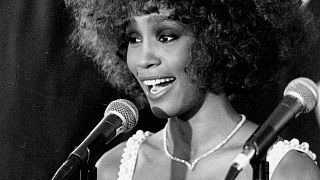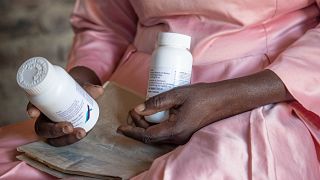USA
Ten years after music icon Whitney Houston's shocking death, her reputation lives on as one of the greatest singers of all time.
Houston, a sensation from her self-titled debut album in 1985, was one of the world's best-selling artists from the mid-1980s to the late 1990s. But her voice and image later became ravaged by drug use, erratic behavior and a tumultuous marriage.
Houston sold over 200 million records worldwide during her 25-year career and won six Grammys, 16 Billboard Music Awards and two Emmys before her death on 11 February 2012, aged 48.
The star remains lauded for hits like "The Greatest Love of All," ″I Will Always Love You" and "I Wanna Dance With Somebody."
"I think Whitney's legacy is going to always be that of a once-in-a-generation voice that really did change the scope of popular music and was a blueprint for a lot of artists of all genders, of all races, to study and to embrace and to also try to replicate," said Gerrick Kennedy, an entertainment reporter and author of "Didn't We Almost Have It All," an exploration of Whitney Houston's genius and celebrity.
"I think we see her legacy every time we hear Brandy sing, every time we hear Ariana Grande sing, every time we hear Adele sing, every time we hear Jennifer Hudson sing," Kennedy said. "I think her legacy is going to always be the absolute brilliance of her voice and what that gave to us. But it's also going to be the barriers that she broke for women in particular."
But Kennedy said there's another aspect to Houston's legacy that many don't realize: More kindness and understanding when it comes to addiction.
"For some people it's going to be, you know, 'Hey, losing Whitney was kind of the first time I actually had to really reframe how I think about celebrities or how I talk about them.' Or, you know, maybe I make less jokes now, because then a couple of years later, we lose Prince, who we didn't know was struggling with addiction," Kennedy said. -
"Maybe it's not as clear cut as what we did with Whitney, which is like, 'Oh, this is a choice you're making and shame on you and you're throwing away your voice,'" Kennedy continued. "And for so many people, it was easy to just judge that way without understanding some of the complications of what we know now, which is what has always been true, which is there's no easy way that a person becomes addicted to any one thing. I mean, it's just not that cut and dry. But I think our kindness to celebrities is also something that having lost her is going to be part of her legacy, as well, because it did shift a little bit. Slowly and only because we learned more hard stuff after she passed away. And then we lost her daughter and the whole tragic arc that continued there."
Houston was the daughter of gospel singer Cissy Houston, the cousin of 1960s pop diva Dionne Warwick and the goddaughter of Aretha Franklin.
She first started singing in church as a child. In her teens, she sang backup for Chaka Khan, Jermaine Jackson and others, in addition to modelling.
In 1992, she found success on the big screen, starring opposite Kevin Costner in "The Bodyguard". It gave her perhaps her most memorable hit: a searing rendition of Dolly Parton's "I Will Always Love You," which sat atop the charts for weeks.
Kennedy said that sadly, Houston's struggles often eclipsed her talent in the public eye partly because of the princess image that was manufactured for her.
"She is someone who we all had this relationship with and to but she is also one of the most unknowable humans that we've ever had because so much of how we came to know her was through the presentation of her," he said. "You have an image. And so part of that image was, you know, the gospel legend mom and, you know, the lineage that she came from and obviously growing up in the church and sort of these like really baseline things. But I think we got really caught up in like, wanting to know all the dirt. We got so caught up in like, 'Where did she learn drugs at first? And what actually happened with her and Robyn (Crawford)? And like, she couldn't possibly have wanted to be with Bobby.' Where there was this level of which our interest in her was never really her as a person, it was her as a story."
An authorized biopic of Houston is due out by the end of the year.











02:20
France: Avignon Festival celebrates Egyptian diva Umm Kulthum
Go to video
Almost 300 killed in wave of violence in Sudan’s North Kordofan
01:11
World leaders express condolences over death of Nigerian ex-president Muhammadu Buhari
02:19
Thriving, not just surviving: Gloria Gaynor releases new EP
Go to video
Angélique Kidjo makes history as first black African artist on Hollywood Walk of Fame
01:30
Nigerian singer Tems launches Leading Vibe Initiative to support women in music